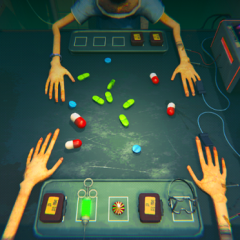Human Expenditure Program
Human Expenditure Program is an experimental narrative game where the player takes control of Eun-Mi, a woman placed inside a simulated environment. Her role is to take care of Harvey Harvington, her husband, who exists in the program as a controllable subject. The game mixes elements of a virtual pet with moral decision-making, requiring the player to manage Harvey’s basic needs while also handling choices that affect memory, identity, and outcome.
Gameplay and Core Systems
Most actions revolve around daily care. The player can feed Harvey, play with him, and maintain his overall state. At the same time, the simulation introduces mechanics that involve resetting or preserving memories, which alters how Harvey behaves and what he remembers from past interactions. These choices influence both immediate reactions and long-term narrative consequences.
Core features of Human Expenditure Program include:
· feeding, playing, and maintaining Harvey’s condition
· a memory system where resets or preservation lead to different outcomes
· moral decisions that affect relationships and endings
· short minigames linked to progress and rewards
· resource management with in-game currency
Together, these systems define the balance between caring, controlling, and experimenting inside the simulation.
Story and Variations
The narrative unfolds gradually, revealing fragments of Harvey’s past and Eun-Mi’s role in the program. Notes, dialogue, and environmental details add context, while the player’s decisions determine how much Harvey remembers and whether his personality changes. Multiple endings are possible, depending on whether the player focuses on keeping him stable, experimenting with resets, or pushing the system to its limits. The storyline highlights the tension between care and control, making every interaction a part of the broader narrative.
Progression and Challenge
Progress is structured around days in the simulation. Each day introduces opportunities to complete tasks, earn resources, and unlock new dialogue. Minigames appear as interruptions or challenges that must be cleared to continue. As time passes, the moral weight of decisions grows heavier, since resets may erase progress but also prevent negative outcomes. The player learns strategies through trial and error, and repetition builds knowledge of how the simulation reacts.
Human Expenditure Program places the player in a position where caregiving is mixed with ethical responsibility. Success is not about reaching a single fixed goal but about managing Harvey’s condition while deciding how much of his identity should be preserved. The combination of care, resource use, and memory control creates a structure where small choices carry long-term impact. The game’s focus is on the consequences of action inside a closed system, where the player must weigh every decision carefully.













































